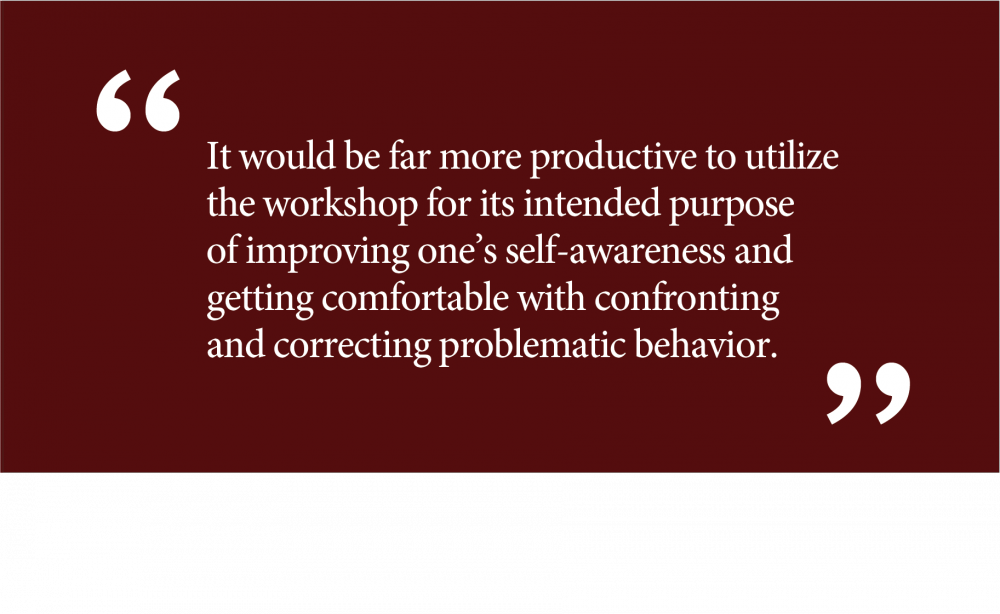A few weeks ago, a group of Minority Peer Counselors hosted one of several planned workshops designed to address issues facing racial and ethnic minorities at Brown. The workshop, entitled “Are You Problematic?”, came in the wake of the Black Alumni Reunion that had taken place two weeks prior. This reunion was particularly significant, as 2018 marks 50 years since the 1968 walkout staged by black students from Brown and Pembroke College to pressure the University to increase the admission of black applicants. The MPCs who organized the workshop highlighted that there is more work to be done to build upon this legacy, half a century later, and engaged the attendees in brainstorming efforts that Brown ought to pursue to make amends for its racist history.
Apparently, not everyone approved of the topic of the workshop. On the day the event was to take place, an anonymous student taped a note reading “It’s okay to be white” on an advertisement for the workshop posted under Wayland Arch. It is important to note that nowhere in the ad were white students addressed specifically. The workshop was not meant to impress upon students that it is not okay to be white. It seems that the anonymous author made the misguided assumption that the term “problematic” in the title must inherently mean “white.” Given that there was nothing in the ad that explicitly mentioned white people, one should wonder how and why this anonymous student managed to arrive at this conclusion.
We have seen others make similar false equivalencies on a larger scale. When Colin Kaepernick first took a knee during the national anthem to protest police brutality against black people, opponents exploded on social media with criticisms because they saw a protest against America itself. Similar conflations have also been made regarding gender. With the rise of #MeToo and the increasing awareness of sexual assault against women, a number of men have felt unfairly targeted and even endangered by the movement, thus prompting the hashtag #NotAllMen. This “not all ___” sentiment is apparent in race relations in broader society and locally on Brown’s campus.
The message taped to the MPC ad reflects the misguided view that by using “white people” as an umbrella term in discussions about racism, white students are being unfairly lumped together with those who participate in very explicit, dangerous forms of racism such as white nationalism. There are those who feel as if they are being guilt-tripped into accepting responsibility for problems that they do not actively contribute to. It is important to recognize, however, that racism does not always manifest in extreme ways. Yes, there are institutional demonstrations of racism such as mass incarceration and discriminatory voting laws in certain states, but racism is also present in daily interpersonal habits, such as dating “preferences” based on race and arguing that people of color have an advantage in college admission processes by virtue of being minorities.
There is currently debate over whether or not everyone, not just white people, can be racist. The question is whether racism is a systemic phenomenon, or if it consists of any instance of insulting or discriminating against another person based on their racial identity. I argue that while all forms of racism are discriminatory, not all forms of discrimination represent racism. Racism is a system which depends on the power to undermine the status of another race in society. For example, racialized name-calling toward a white person by a person of color does not qualify as racism since people of color do not stand in a position of power where this action can promote their superior status in a larger systemic hierarchy.
Both white people and people of color can, however, be problematic. The term problematic in this context encompasses any behavior that reflects prejudiced stereotypes and beliefs one holds about another person based on their race. Unlike racism, this prejudice is not contingent on coming from a position of power. The title of the MPC workshop is an invitation to students of all backgrounds to examine ways in which they may unknowingly exercise problematic habits. Rather than take the topic of the MPC workshop personally as an attack against white students, it would be far more productive to utilize the workshop for its intended purpose of improving one’s self-awareness and getting comfortable with confronting and correcting problematic behavior.
Jordan Allums ’21 can be reached at jordan_allums@brown.edu. Please send responses to this opinion to letters@browndailyherald.com and other op-eds to opinions@browndailyherald.com.





